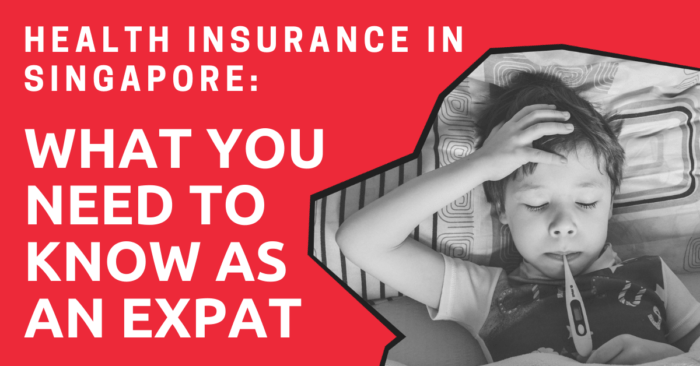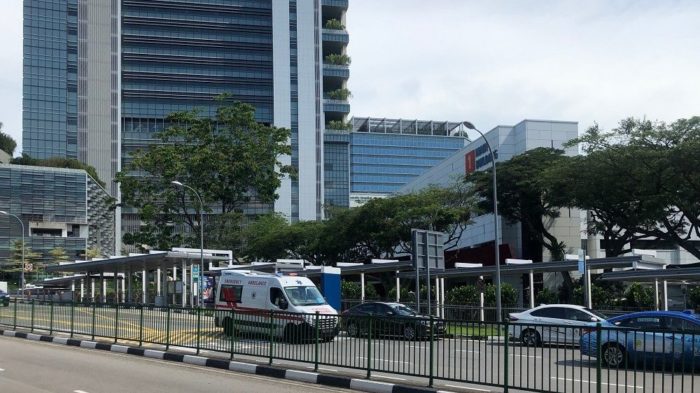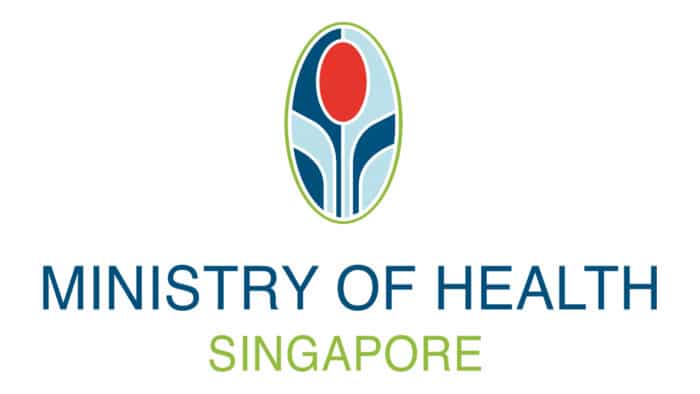
Healthcare in Singapore is rated very highly in terms of quality and expertise, especially in comparison to many of its South-East Asian neighbours, but it doesn’t come cheap.
An average trip to the GP may only cost SGD $20 – $50, but an overnight stay in the hospital can easily accrue a bill running into the thousands, even for the most minor of treatments.
The running joke in the local community is that it’s cheaper to die than fall ill in Singapore, and that’s with the luxury of government subsidies and a very affordable national insurance plan to underwrite the cost of local Singaporeans’ bills.
Expats are not entitled to these; if you need to see a doctor or visit a hospital, all the costs will come out of your own pocket if you don’t have private health insurance.
So, if you are moving to Singapore, an essential consideration before you even pack your bags will be buying a health insurance plan for yourself and any family members joining you.
Read this guide to find out everything you need to know about health insurance plans available to expats in Singapore.
All prices quoted throughout the article are in Singapore Dollars (SGD).
This article will take approximately 31 minutes to read. Don't have the time right now? No worries. You can email the ad-free version of the article to yourself and read it later!
Disclaimer: This article may include links to products or services offered by ExpatDen’s partners, which give us commissions when you click on them. Although this may influence how they appear in the text, we only recommend solutions that we would use in your situation. Read more in our Advertising Disclosure.
Contents
- Key Takeaways
- Public vs. Private Healthcare System in Singapore
- Why do you need health insurance?
- Who actually needs health insurance?
- Insurance Options
- Health Care Insurance Plans Explained
- Finding the Best Insurance Plan for You
- How much does health insurance cost?
- Application Process
- Does my company have to provide a health insurance plan for me?
- Does my home country’s national health care cover me?
- Does my travel insurance cover me?
- What happens when you leave Singapore?
- Now, on to You
Key Takeaways
- Public insurance in Singapore is mainly available to Singaporeans and PR holders only.
- Expats can take advantage of public or private healthcare, but the cost will be out of pocket if you don’t have health insurance.
- Expat health insurance is typically the best option as it provides extensive coverage both in Singapore and your home country.
- Your employer may provide group health insurance, but coverage is typically minimal, so you can purchase additional coverage.
- If you’re not sure about which health insurance package to purchase, check out our expat health insurance comparison tool to help you make an informed choice.
Public vs. Private Healthcare System in Singapore
Singapore has a large and first-rate public healthcare system. It isn’t free, but is considerably cheaper than the private healthcare system that runs alongside it.
Public healthcare is delivered through a series of polyclinics and public hospitals. Polyclinics are subsidised medical centres spread across the whole island, serving as a one-stop health centre providing all outpatient services.

There are 23 of these polyclinics across Singapore, making up 20% of all healthcare services, and these feed into 16 public hospitals, which are all themselves of an exceptionally high standard.
The private health system is made up of over 2,000 GP clinics and 12 private hospitals.
The quality of medical practice between private and public healthcare is pretty indistinguishable, so the choice of where to go really comes down to cost and service. Private clinics and hospitals can cost as much as three times as the public services, but this is offset by shorter waiting times, smarter consultation rooms, private bedrooms, better food, and so forth.
Really, the difference is between being treated as a patient versus that of a hotel guest, albeit a sick one.
Why do you need health insurance?
By now, you’ll be getting the picture that there is an essentially competitive public and private healthcare system in Singapore, both of which are excellent, but neither of which is free. So how do you avoid incurring huge debts anytime you need to see a doctor?
Enter health insurance.
If you are a local citizen or foreign PR (permanent resident), stop reading now. You are lucky enough to be on the receiving end of government subsidies and a national health insurance plan, MediShield, so you aren’t in need of the following advice.
If you are an expat living in Singapore, then I suggest you become very familiar with the following article before you embark on taking up a health insurance plan.
There is a plethora of information and understanding that needs to be assimilated to ensure you find the right health insurance for your needs.
Who actually needs health insurance?
Let’s reiterate this, if you are an expat living in Singapore, you are not eligible for local government subsidies or national health insurance schemes. You need your own independent health insurance plan.
Within this broad brushstroke of ‘expats living in Singapore,’ you are likely to fall into one of the following categories:
- You moved to Singapore for work, and while your employer offers health insurance as part of your contract, you wish to upgrade it with additional services.
- You have started your own business in Singapore and need to put in place your own health insurance plan from the outset.
- You are a ‘dependent,’meaning you’re married to or are a child of, either a local citizen or foreigner with an employment pass and are not covered by their health insurance plan.
- You are a student living in Singapore with a Student Pass to study at an international school or university.
Insurance Options
We’ve already established that, as an expat in Singapore, you need to buy a health insurance plan, so now let’s look at what types of plans are available to you.
Expat Health Insurance
Expat health insurance covers you beyond the boundaries of Singapore. Sometimes referred to as ‘international health insurance,’ it is specifically catered towards working expats who live in Singapore but travel globally, be it to their home countries or beyond, and therefore need medical insurance that covers themselves and their family members wherever they are.
Expat insurance plans generally have a higher outpatient reimbursement limit and a higher overall annual coverage limit. They also allowyou to consult a specialist directly without the need for a GP’s referral letter, and you can enjoy a cashless process for both GPs and specialists.
Read more about the benefits of these plans later on in this article.
There are two types of international plans available.
Firstly, those offered by international providers (otherwise known as offshore plans) that offer coverage to individuals wherever they live and travel. Some of these providers even self-style their packages specifically as ‘Expat Health Insurance’ plans.
For example, the Cigna Global Health Options targeted directly at foreigners living abroad for several years.

There are many offshore international insurance plans available to expats in Singapore, and it is important to do your research before choosing, but a couple of plans that many expats use are those available from Cigna, William Russell, IMG Global, and GeoBlue International.
Some policies are tailored to, or attract, specific nationalities as well.
For example, the GeoBlue Xplorer plan is especially suited to US citizens, because it not only covers you internationally but also gives you coverage for trips back to the US for long periods at a time.
Then there are those offered by local insurance providers, such as Liberty myHEALTH International Health plan, which offers a wider coverage beyond the boundaries of Singapore, but don’t forget to specify that it is the international plan that you are after when talking to these providers.
Check out our expat health insurance comparison for a more in-depth comparison.
Local Health Insurance
While local citizens benefit from Singapore’s national health insurance plan, MediShield Life, many of them will also invest in additional plans, known as ‘Riders,’ to boost their coverage and offerings.
These local insurance provider policies are aimed at local clientele but are available as a stand-alone product to foreigners as well such as the NTUC IncomeShield Advantage.
There are a few important considerations to bear in mind when looking at a local healthcare insurance plan.
- As a foreigner, your premiums may be different from ones quoted for locals – sorry, it’s just a fact of life as these policies are not aimed at you – but the premium is still likely to be lower than that of an international policy.
- Coverage is only for accidents and illnesses occurring within Singapore, except in emergency situations, and you need to be hospitalized in order to make a claim.
- You need to pay your medical bills yourself prior to making the claim, and there is always a co-payment component with local insurance (see later for co-payment details).
If the plan contains the word ‘shield,’ then that is generally an indication that it is a local plan designed to be added as a rider to the basic MediShield Life offering for locals.
Long-term expats are attracted to these plans for their considerably lower premiums and often add on travel insurance to cover them outside of Singapore, but an expat who travels regularly, returns ‘home’ frequently, or who may be relocated elsewhere within a few years will generally be better off looking at the international plans on offer.
Group Health Insurance
Many expats in Singapore will have healthcare covered by a policy provided through their employer.
This will be a group policy for all staff in the company, which usually covers most major treatments. Policies vary widely across companies, with some offering limited benefits such as shared ward admission only to others that are so good that it gives employees extra reason to stay in the job.
Most of the time, group insurance is sufficient while you are in Singapore, but many expats will look to take out their own personal international health insurance to cover themselves in case of a change in jobs or retirement and to cover their family members.
Travel Insurance
Travel insurance is not the same as global health insurance, but many policies do include some element of health care coverage and medical plans when travelling.
It’s advisable for all expats to consider travel insurance as well as health insurance, not just for those moments when you lose a bag in the airport, but for expats who opt for a local insurance plan then the medical element of travel insurance is a necessity so that you are covered for illness and injury outside of Singapore.
Choosing travel insurance is a whole other ball game for another article.
Health Care Insurance Plans Explained
Health insurance is a type of insurance that covers the whole or part of the risk of yourmedical bills. You pay an annual premium (which can be paid in one lump sum or as monthly payments), and the provider will reimburse you for expenses incurred from injury and illness in accordance with the benefit levels and/or restrictions outlined in your personal plan.
Every provider and plan will have slightly different offerings, but there are some standard and optional features, eligibility criteria, and exclusions that you should be aware of as follows:
Coverage Limit
All policies come with an annual limit. This is the maximum amount claimable in any one-year-long period. These limits will vary greatly across policies, but as a rule of thumb, the lower the premium you are paying for your policy, the smaller the annual coverage limit.
You want to bear in mind here that a single stay in a hospital can run up a bill worth thousands of dollars.
For example, if you have a heart attack, you are looking at an average bill of $85,000 to cover the cost of surgery and inpatient care that will be required to get you back on your feet.
You can run your own price check on different surgical procedures through the Singapore’s Ministry of Health (MOH) website.

Area of Coverage
While an international insurance health plan is aimed at expatriates who live and travel all around the world, you can still actually choose the area of coverage that you require.
Generally, the options are worldwide, worldwide excluding the US, or worldwide excluding the US plus a number of other identified territories.
As a rule of thumb, unless you really need it, you should not include US coverage in your plan, since it can significantly increase your plan’s premium.
Benefits
International health insurance policies all come with outpatient and inpatient treatment coverage as standard features, and then offer a range of additional options that can be included either by upgrading to a higher policy or adding them as a ‘Rider’ to your existing policy.
These standard and optional benefits generally include:
Inpatient Treatment
This is coverage for when you require hospitalisation or surgical procedures. As well as the procedural expenses, check how much it covers expenses such as ward/room cost, diagnostic testing, medicine, and follow-up consultations.
Both local and international policies will cover these up to a certain limit, with most providers offering different levels of benefits according to which policy you choose.
Normally, you need at least a US$1,000,000 limit for this.
Outpatient Treatment
This is coverage for treatments and prescription drugs offered by GPs, specialists, and/or therapists that do not require an overnight stay in the hospital.
All international providers will cover this up to a set annual level, which will differ according to your policy. Some insurance companies may include it in their basic plans while some you need to buy additional coverage for it.
This is one of the key differences between an international and local policy, which won’t include outpatient treatment as local policies only kick in when you have been hospitalized.
Travel & Emergency
This will vary widely across policies but is aimed at covering emergency medical evacuations and repatriation rather than an intention to replace your regular travel insurance. Most plans offer some level of coverage but likely with an annual limit in place.
Dental & Optical
Sometimes added together as one or as separate features that can be bolted onto your plan, dental benefits can include routine checkups, cleaning, and simple non-surgical extractions.
See our separate article for How to Find a Dentist in Singapore.
Maternity
If you are to believe everything you read in Facebook groups, maternity coverage is one of the most talked about features of health insurance; are you or aren’t you covered? What are you covered for? And so forth.
Maternity care in private hospitals is notoriously expensive, so if you are planning on having a baby while living in Singapore, I suggest you consider maternity coverage.
Maternity coverage usually comes with a waiting period. Most insurance plans have a 12-month waiting period before maternity-related expenses will be covered within their plans.
Some views are that it’s better to save the money after you have had the baby and hope that all goes smoothly within the public system. With the cost of giving birth in Singapore being, on average, $5,500 in a public hospital, this might feel like quite a gamble to some prospective parents.
While on the subject of babies, it is worth also pointing out that birth control is rarely covered as a medication cost unless it has been prescribed for medical reasons.
Pre-Existing Conditions
Like maternity coverage, pre-existing conditions are another hot topic amongst expats debating which health insurance to choose.
When joining a group health insurance plan, such as through your employer, pre-existing medical conditions are covered automatically, but when taking out private international health insurance, they rarely are.
Most insurers will require you to fill out a medical form on application and will then decide whether to cover pre-existing conditions on a case-by-case basis.
On the rare chance that your pre-existing conditions are covered, your premiums will be much higher. This is a good reason for finding a good international health insurance that will cover you globally from the outset of your expat journey and stick with it through any subsequent relocations.
Exclusions
Singapore is about as safe a place as it gets to live, but that doesn’t mean you should be complacent when looking at what is and isn’t included in your health insurance. While Singapore itself isn’t likely to suffer a terrorist attack anytime soon (never say never, though), the same can’t be said for many of the popular regional holiday destinations.

And who hasn’t been tempted by a spot of diving or other adventure sports when on holiday? Items like terrorism and adventure sports are rarely, if ever, included in international healthcare packages, but as with all things, they can frequently be added on for a price. It’s worth checking.
Items generally considered as firm ‘exclusions’ include:
- Acts of war
- Hostilities & military actions
- Nuclear explosions and resulting nuclear fallout
- Genetic cancer screening
Some policy providers will offer optional riders for terrorist acts and adventure sports, but you will need to have taken out their most premium platinum plan to have access to these.
Deductibles & Co-Payment
Deductibles are the amount you pay for a medical service or consultation before your insurance plan kicks in. For example, if you have a $2,500 deductible on your plan, you will pay the first $2,500 of your covered services yourself, and then the policy will commence.
Deductibles are only paid once in the annual period of cover, regardless of the number of claims made in the same period.
Co-payments (or cost-shares) are payments you make on individual services used during the claim period. These kick in after the deductible has been paid. For example, your plan might have a $20 co-payment element for doctor consultations.
This means that after you have paid the deductible level (say $2,500 as above) and then have a subsequent consultation that costs $100, you will pay $20 of the $100 fee and the insurance policy will pay the remaining $80.
Generally speaking, plans with lower monthly payments will have a higher deductible and co-payment element.
Many policy providers, such as GeoBlue’s Xplorer plan, highlight no deductibles on standard GP visits as an alluring benefit, while others, such as Cigna, offer plans with a wide range of choice on levels of deductibles and co-payments, so that you can tailor make a plan to suit your monthly budget for the premium.
Eligibility
Every insurance provider has different eligibility criteria. The ones to look out for are:
Place of Residence
To qualify for an international health plan offered by a Singaporean provider such as the Liberty MyHealth International Essential, you must be residing in Singapore on a valid pass.
In comparison, offshore providers make their plans available to all nationalities living and travelling abroad from their home country, wherever that may be.
Age
To purchase your own individual international health insurance you will need to be 18+, however, as a family member you can be insured under a family plan from just 14 days old.
What you really need to consider is how long you are insured for.
Some plans guarantee lifetime coverage provided you stay on the plan continuously, others, such as the IMG Global Medical plan, only guarantee you up to 74 years old, unless you have purchased the plan before you turned 65 and maintained continuous coverage, in which case they will automatically roll you onto their Global Senior Plan.
Read the eligibility small print carefully if you are 64!
Renewals
Provided you are still meeting the eligibility requirements, plans are renewable annually and will provide continuous and seamless coverage. Renewal is normally a very easy process; after all, let’s face it, once an insurance provider has your business, they don’t exactly want to make it easy for you to jump to a competitor!
Cancellations
As with most purchases in life, if you change your mind, you can cancel the policy at any point prior to the coverage commencing, or up to a period, typically 15 days, after it has been approved. If you decide after that, then too late, you’ll need to stick with it for the year and then start again with another provider.
To invoke a cancellation in this “cooling off” period, you likely need to submit a cancellation request in writing, so it’s best to read up on these terms before you might need them—you don’t want to be scrambling around for an envelope and stamp on the eve of the 15th day.
Finding the Best Insurance Plan for You
This is where the fun starts. Singapore has many competitive insurance options, with policies offering benefits that seem too good to be true (they likely are) to those with ultra-premium packages that are surely only for the likes of celebrities and A Lister-wannabee globe trotters.
So how do you go about finding a plan that offers both excellent value-for-money and fits your needs?
Choosing your level of coverage
First up, it’s about understanding what your needs are.
- How long do you intend to be in Singapore?
- Will you be travelling frequently? How often do you return home
- How long on each visit?
You may want to start with just a regional plan.
If you know you are making Singapore ‘home’ and will be here for the long term, then some of the local plans offer excellent value.
But if you think there is a chance you are going to be moving around and joining the expat journey of three years here, two years there, then I’d suggest you want to look at a more flexible international plan that is going to move with you.
Equally, it might be that you have an existing plan in place, and it’s about looking for additional coverage, adding, say, dental or maternity. Then the question is more likely to be, what are my options?
Start with understanding your goal and fitting the plan to you, not you to the plan.
Where can you buy health insurance?
While it is entirely possible to buy health insurance directly from the policy provider, you will quickly learn that it’s not necessarily the fastest or easiest route.
In Singapore, most insurance is sold through agents or brokers representing an insurer or group of insurers, but you can still refer to the insurer’s website for information on the different health policies and premiums so that you are making an informed choice.
Brokers receive a commission on every policy sold, so it is definitely worth doing your own bit of research on which broker to use —word of mouth is a good way to get solid referrals, or post a question on a trusted FB group. You can be fairly certain that any negative stories about one particular broker or another will come flying back to you very quickly.
If you have a doctor or clinic you especially trust and want to use, ask them which insurance they take, and will bill directly to, and this will give you a good starting point for your own research.
Comparison Websites
Another good way to sift through the multiple options is by looking at a comparison website such as this one from International Citizens Insurance. These sites will list the most popular range of health insurance plans on offer and compare all the different features for you in a logical and clear way to help you make quick cross-comparisons and find the right match for your needs.
You can even request quotes directly from these sites.
Alternatively, you can use our expat health insurance comparison page to compare the plan yourself and get quotes directly from our partnered agents.
Company Reputation
Something else to bear in mind when finding the right plan is ensuring your proposed policy provider can actually deliver when it comes down to it. No one wants to be caught short in an emergency trying to establish what hospital you can or can’t be admitted to.
Look for a plan that has a large network of international hospitals and health care providers available and 24/7 access to an emergency hotline plan.
For example, Cigna Global Plan gives you access to over 1 million hospitals, doctors, and health care facilities, while the GeoBlue Xplorer health plan also calls on a new generation of medical assistance services, with access to a suite of online and mobile tools to identify, access, and even pay for quality healthcare globally.
How much does health insurance cost?
How long is a piece of string? The majority of health insurance providers offer a range of products, from entry-level plans to premium packages. You just need to identify which is right for your health needs and wallet.
Premiums will vary, it will depend on your age, your country of origin, your health at the time, the coverage area you choose, whether you are including any riders, and so on. Policies are designed to give you a menu of options that you can tailor to suit your budget.
If really pushed to give a figure on it, my conservative estimate would be to say that provided you are under 65 and have no underlying conditions, the average person will be looking at paying around $2,500 to $3,000 annually for a policy that covers medical expenses up to $1 million per year.
Application Process
Submitting an Application
Once you decide on your preferred policy you will need to put in your application. You will normally be required to submit supporting documents, such as a health assessment from a doctor or other health care provider. Your application will then be reviewed and underwritten, and your premium determined.
After your application has been approved, depending on the insurance policy, you should be offered the same terms on each annual renewal, although be aware that premiums will increase with age.
On some policies, once this process is done, the information is held on file, and it is considered underwritten for subsequent renewals until you make a claim, at which point, depending on the symptom and treatment required, you may be required to have the policy underwritten again and your premium may change.
It’s best to check the small print to ensure this is not the case for absolute peace of mind.
Making a Claim
Depending on your policy and provider, you may need to pay the medical bill yourself first and then make a claim. If this is the case, then when you are ready to make the claim, you fill in the form (online or not) and submit relevant documents such as invoices, the hospital discharge summary, and doctor’s reports.
For others, your insurance company may make the payment directly to the doctor or hospital and in fact will actively prefer it, as do the healthcare providers, as it saves a lot of hassle in making claims and paybacks.
Generally, on arrival at a health care facility you will be asked to provide your insurance policy details, so it is a good idea to keep these handy.
Many providers will issue you with a handy insurance card with your policy number on it that you can whip out when needed.
The big providers such as Cigna also promote the fact that they have ‘Customer Care’ teams. This is a dedicated team / hotline who you can reach out to, for help in arranging your treatment plan in a hospital or surgery of their approval.
Prior Authorization
Where possible, we recommend that you inform your insurer (or agent if you used one) prior to any procedure or treatment to ensure that it is covered and to provide any details as needed. No one needs to come around from an anaesthetic to discover an unexpected bill for a treatment that wasn’t covered in that hospital.
Most policy providers will require that you either seek prior approval, or in instances where this isn’t possible, that you (or a family member) get in touch with them within a 48-hour window after treatment.
Renewals
All policies are renewable on an annual basis. For the most part, this is a painless process whereby the provider will notify you of the upcoming renewal date and request that you pay your annual premium or adjust your monthly payments but remember, this is a policy to support you and your family.
It is vital that you check that it is still covering what you need. Don’t forget inflation may have made medical costs rise so perhaps do a check that your policy still covers the level you’ll require—this is especially important if it is covering current conditions or medications that may increase in price over the year.
Does my company have to provide a health insurance plan for me?
If you are in Singapore on a work permit or S Pass, your employer is bound by law to provide you with health insurance to the tune of $15,000/year. If you are on an Employment Pass the company isn’t obliged to provide you with coverage, but if they do, you’ll want to check whether it covers what you want it to.
You might want to upgrade some of its features.
Does my home country’s national health care cover me?
Some nationalities have excellent ‘home-country’ national health care provisions, and these may continue to provide limited coverage for short periods of time abroad.
However, it is worth noting that the coverage in these policies will be a fraction of any bill that you incur, and do check how long you are actually covered for. It is likely to be a lot less than you realize.
Most governments will advise their citizens to purchase international health insurance as soon as they relocate away from home.
If you are a US citizen, it is worth noting that GeoBlue offers a reduced rate to US citizens who carry a US health plan, with good options for those who want a plan including lengthy trips to the US or a different option if you have no intention of visiting the US at all while you are away.
Does my travel insurance cover me?
When you first arrive in Singapore, you may think that you are covered by your travel insurance, but as soon as you are staying in Singapore under an employment pass of any form, rather than staying under the 6-month tourist visa given on arrival, your travel insurance will no longer be valid as you will no longer be considered to be ‘travelling’ or ‘passing through’ Singapore.
It’s also worth noting here that if you consider yourself a ‘Digital Nomad’ and see yourself more as a traveller than an expat, but still have a base in Singapore, you should still be considering health insurance as a stand-alone product to your regular travel insurance.
IMG Global offers a good plan specifically for global nomads.
What happens when you leave Singapore?
The answer to this lies in which policy you purchased.
For those of you who bought a local policy, you are going to need to start again as the policy is only going to cover you for hospitalization within Singapore, so if your residency status in Singapore changes for any reason, you have no option but to terminate the policy; for those of you on a local international policy (an international policy purchased through a Singapore based insurer), you need to check the details.
It is possible that relocating away from Singapore will change your premium or even make the policy redundant.
International or expat health care policies, on the other hand, are designed to work with you wherever you live or travel to, so leaving Singapore is not going to fundamentally change your policy, however, we do recommend that you notify them ahead of time.
You don’t want to give any insurance provider any option to claim that you are no longer eligible for any reason whatsoever.

It is also worth noting that under an international health care policy, changing your country of residence doesn’t trigger a new contract or need to underwrite; therefore you will not need to declare any pre-existing conditions when you land in your new home country.
But if your new home has medical care that is more expensive than Singapore (like the US or Hong Kong), it might change the cost of your annual premium, as the risk for your insurance company to have to pay out for higher cost bills has increased and they will inevitably pass this onto you.
Now, on to You
Well done, you now have a comprehensive overview of health insurance in Singapore. So now it’s time to get out into the real world and make a purchase.
To help you make an informed decision, here’s a recap of the top things to consider and questions to ask:
Look for a policy that gives you flexibility. Expats frequently have to change their lives in very short time frames, so you want a policy that can change with you. Many expats really like the Cigna Global Insurance plan because it gives you the flexibility to pick what you are covered for, and the company comes with a strong reputation for excellent service and a good global network of health care coverage.
If you aren’t expecting to use your policy for much other than emergencies, then perhaps consider taking a plan that has a lower premium for a lower annual coverage limit. IMG has a reputation for very affordable products, which attract younger clients, who they then retain because of the excellent service provided.
Last but not least, consider where you have come from and where you are going. Many US expats feel comfortable with a GeoBlue Xplorer plan because it is designed specifically for US citizens abroad and gives them coverage for healthcare back in the US, perfect for those long summer or fall trips back home.
As a footnote, please remember health care costs change regularly as do your family needs. Don’t just put the health care insurance plan in a drawer and forget about it, remember to do an annual check that it is still covering what you need and make adjustments accordingly.







